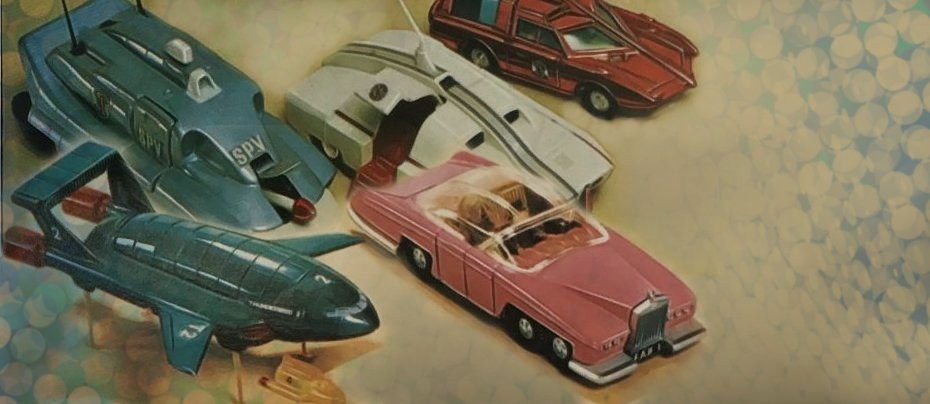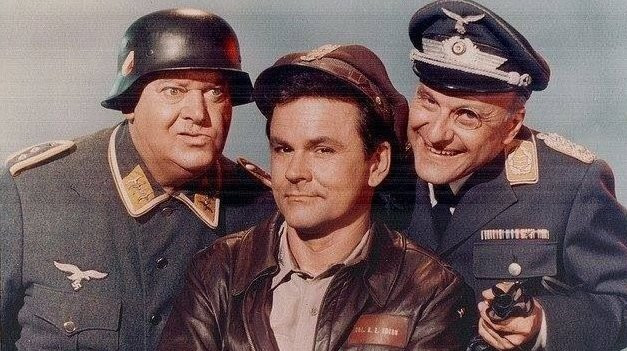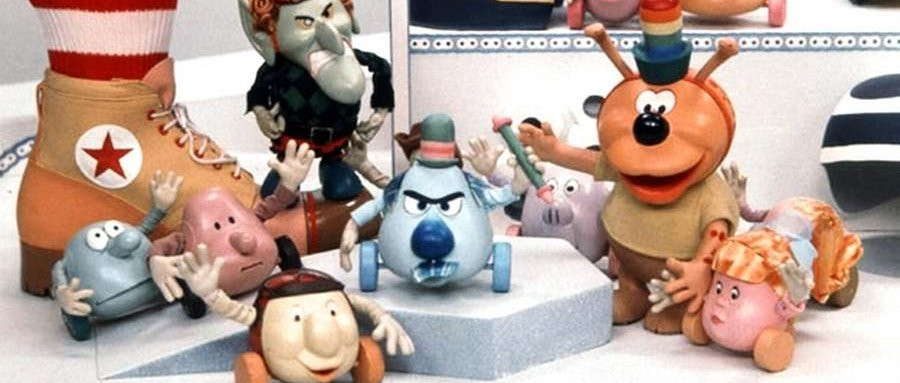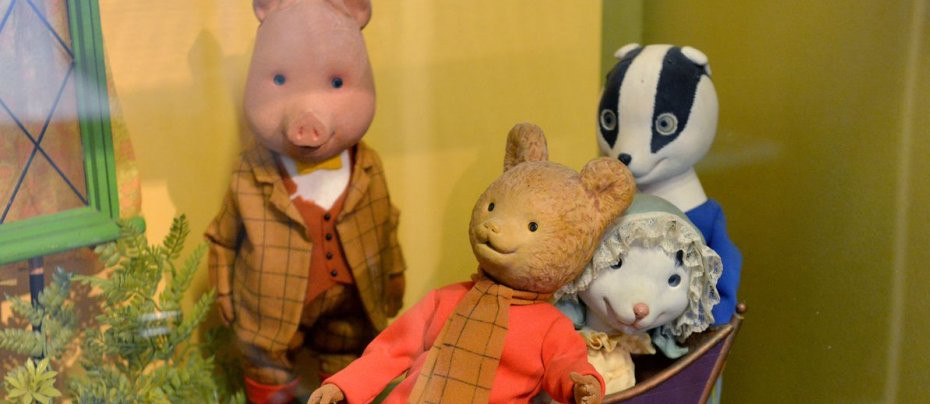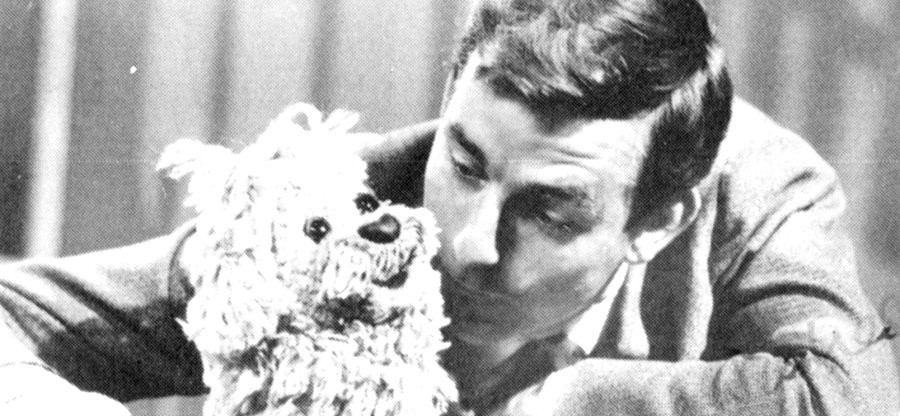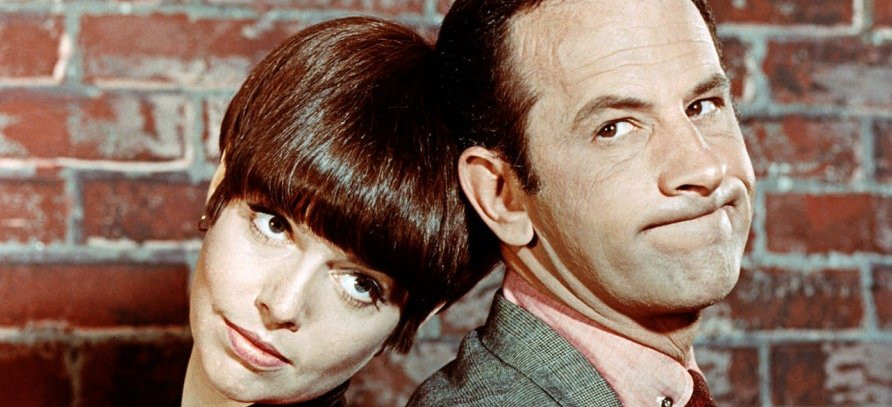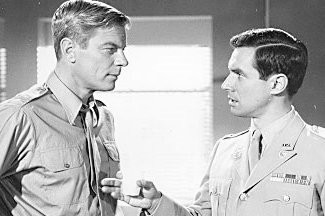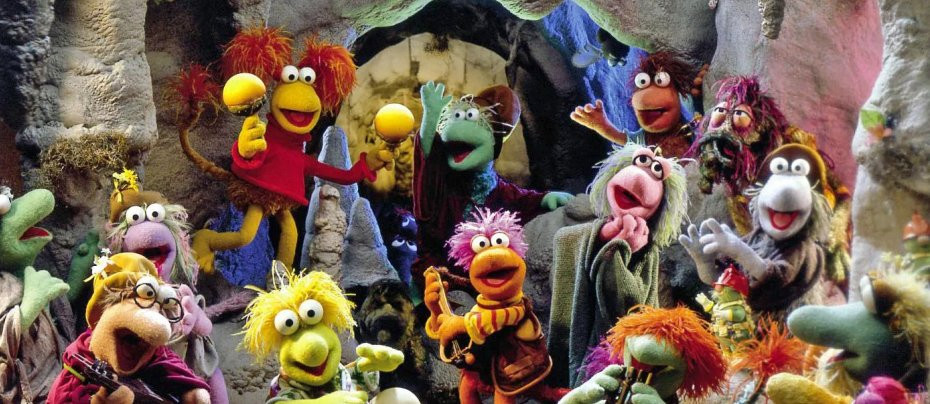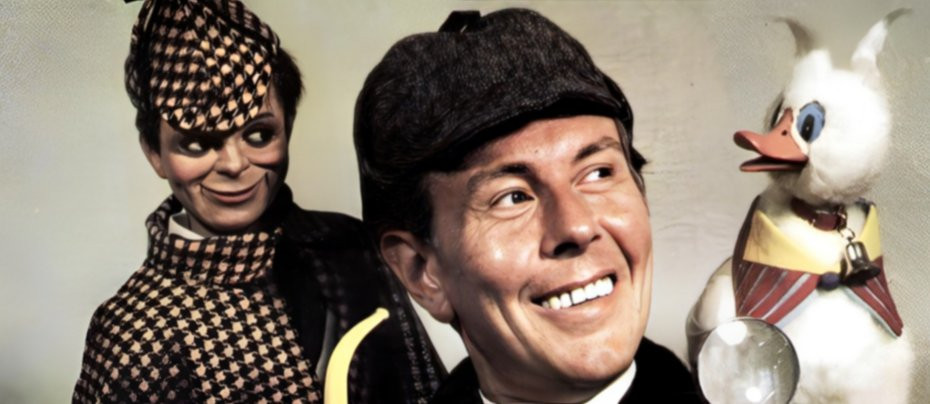
Tich and Quackers
1965 - United Kingdom"yah daft dook!"
Tich and Quackers was a children’s television series hosted by the incomparable Ray Alan, a master ventriloquist who was not only ‘the guv’nor’ when it came to throwing his voice without moving his lips, but who breathed so much life into his dummies that you’d swear blind they were living creatures. The show featured two main characters: Tich, a naughty blazer-wearing northern schoolboy, and Quackers, a duck who didn’t speak - only quacked. Quackers was operated by Tony Hart. Tich’s catchphrase was, ‘Eh yah daft dook!’.
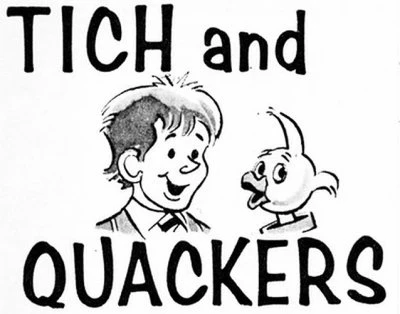
The series gained immense popularity and even had its own comic strip in TV Comic, which lasted until 1971, long after Ray Alan stopped performing with them. He also recorded a single titled ‘Santa Bring Me Ringo’ (I wanna hold his hand), which was a UK version of a 1964 novelty song originally recorded by Christine Hunter, who mercifully seems to have retired after releasing it. The series was aimed at younger children and included a game called Pop n’ Drop. Children from local schools (in Manchester) were invited to take part.
Ray Alan was born Raymond Alan Whyberd on 18 September 1930 in Greenwich, SE London, and was educated at Morden Terrace School, Lewisham.
"I was brought up in circumstances which forced me to accept the harshness of life,” he said in 1974. “Although we were an extremely happy family, I was always aware that nice things didn't last, and you had to have an inner resource to bring you through the bad times."
His first taste of tragedy came when a younger brother was killed in a road accident. Then, with the onset of war and the consequent panic about the safety of children in London, Ray was evacuated. "I sat in a Dickensian church hall in Cornwall with a label pinned to my coat waiting for someone to collect me. At first, there were hundreds of children there, but eventually, everyone was called except for four of us who still sat there…still waiting."
Unable to settle in Cornwall, like many other children who struggled without their parents, Ray was sent home to take his chance in bomb-ridden London. "One night I went out to fetch threepen'orth of chips. I heard this dreadful crash while I stood in the queue and I arrived home to find my house in a heap of rubble and my parents buried in the cellar. It was hours before they were dug out - still alive, thank God.”
At the age of ten, Ray Alan experienced a temporary condition that restricted the movement of his jaw due to a poisoned mouth. Consequently, he had to speak out of the side of his mouth for several days. His mother humorously remarked that he would become a ventriloquist one day, and the word “ventriloquist” stuck in his mind.
By this time, Ray had discovered his knack for ventriloquism. One day, while bored during a school lesson, he playfully imitated the sound of a clucking chicken. To his surprise, his teacher was oblivious to the fact that Ray was the source of the sound and began searching for its origin on the other side of the classroom. Unbeknownst to him, Ray was throwing his voice.
Ray often played pranks on his art teacher by performing peculiar impressions, such as those of a cat or a bee, and watching him search for their source. It dawned on Ray that he could put this unique ability to good use. He crafted a Punch and Judy set from a couple of old hairbrushes and entertained other children with shows. Ray thoroughly enjoyed experimenting with funny voices and also dedicated his spare time to studying magic and ventriloquism.
At the age of 14, Ray left school and began entertaining audiences at various working men’s clubs in South London with a comedy act that incorporated magic tricks and impressions. He got a job as a "call boy" at the Lewisham Hippodrome theatre where he met George Formby who taught him to play the ukelele. All the while, Ray was developing his act which involved impressions and conjuring tricks and he developed his ventriloquy after pretending there were voices coming from a box on stage.
Ray acquired his first ventriloquist dummy and entered a talent contest at the New Cross Empire, where he emerged victorious. This triumph earned him a week’s engagement on a variety bill alongside Jack Warner at the Chatham Royal Theatre. This period marked the beginning of more opportunities for Ray and led to the creation of Steve, an audacious and lively pageboy dummy.
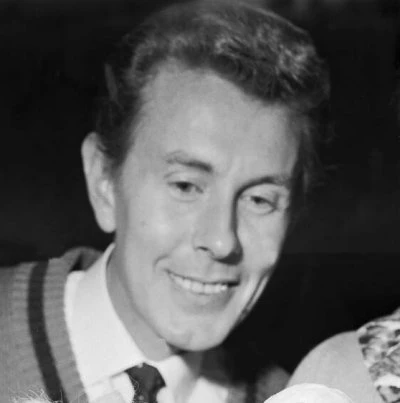
Now nineteen years of age, Ray was made an offer to perform cabaret in India. After accepting the booking, he embarked on his journey to fulfil the engagement. However, upon reaching Karachi, he encountered an unexpected hurdle with the customs officials. They had never seen a ventriloquist’s dummy before and demanded a hefty import duty for the doll. Consequently, Steve was impounded for two days and was only released after Ray showcased his act to gain their approval!
However, Ray’s one-month Indian engagement was extended to eight months.
Upon returning to England, Ray crossed paths with Issy Bonn, a renowned singer, actor, and comedian who also ran an agency. Bonn took Ray under his wing, and the two collaborated on numerous performances. During a week of variety shows in Hull, Ray visited Polly’s Restaurant, a well-known local eatery. The restaurant’s green parrot sign left a lasting impression on him and inspired him to create another dummy. This is how Skippy came into existence. Skippy was so lifelike that one evening, two policemen visited Roy backstage at a theatre where he was performing. They requested to see his quarantine permit for the bird and refused to believe that the parrot was a dummy until Ray demonstrated that it was made entirely of papier-mâché.
In 1960, Ray began a tour of the country appearing at various venues in places like Leeds, Brighton, and Liverpool. He was joined on this tour by Scots comedian Jimmy Mac. By now Ray was beginning to get noticed. On Thursday 31 March 1960, The Stage reported: Ray Alan brings a sure ventriloquial technique and has the added attraction of an amusing, "frightfully posh" dummy - even the dummy's lips are sealed as the alphabet is tackled!
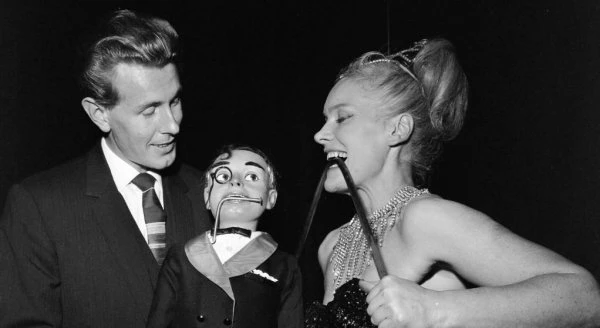
The ”frightfully posh” dummy was one that Ray would become synonymous with – Lord Charles. At a height of just two feet six inches and costing Ray £40.00, Lord Charles was the creation of Ray based on a ‘boozy toff’ he had encountered at a cabaret. The dummy’s face was based on that of Stan Laurel with whom Ray had worked in 1954. "I looked at Stan Laurel's face and I thought 'Good God, that's the face I want ‑ just change the hair and put a monocle on it," he said. "So I played around with some photographs of Stan and found the face, went to the man (who made his ventriloquist dolls) and showed him what I wanted and he made me Lord Charles." The character, who was first introduced to a ‘captive’ audience at HMP Wormwood Scrubs for a charity show, was noted for his catchphrase "You silly arse" and would often be distracted by any glamorous women in the audience - although never in a cringe-worthy way. A critic from The Stage – (Thursday 15 December 1960) was at London’s notorious Windmill Theatre to see Ray perform there and noted that - Ray Alan achieves in the field of ventriloquy with a good deal of ingenuity and an impressive technical skill.
By the 1960s, the popularity of television was having an adverse effect on some ‘dated’ variety acts whilst for others it was a boost. Not wanting to be left behind, Ray knew that in order to be a success he’d have to diversify. “Ten rows back at the Woolwich Empire it didn’t matter if the vent’s mouth was moving or not,” he said. “But when TV came along, I knew I wasn’t going to be able to make a living doing ‘gottle of geer’ and ‘grown gread and gutter’ for the rest of my life.” The fact that Lord Charles spoke with a drunken slur allowed Alan to speak with a minimum of mouth movement. This served him well under the scrutiny of the television cameras.
In January 1963, The Stage reported that Ray was to make his television debut: Five acts make their TV debut taking part in The Good Old Days on BBC-tv next Thursday (Jan. 24). Also appearing is Ray Alan, a young ventriloquist, who is accompanied by 'Lord Charles'. On this occasion, the chairman of "The Good Old Days", Leonard Sachs, is brought into the act. After the debut on television, the BBC were suitably impressed with Ray to ask him to compere another show, and in August 1963, The 625 Show was produced by BBC TV in Manchester, with Jimmy Young introducing the first four shows and Ray acting as compere for the remaining four programmes.
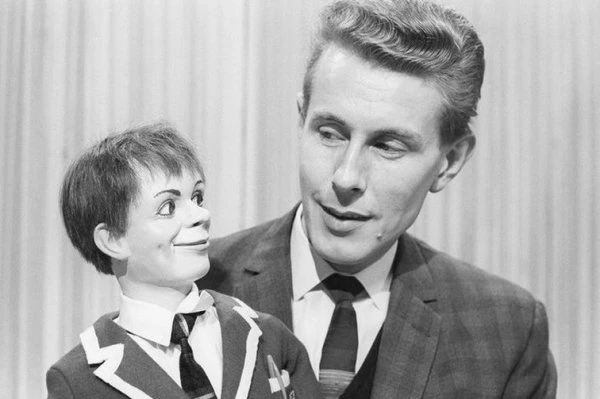
His reputation growing, the BBC thought Ray would appeal to a younger audience as well as an adult one and on 11 October 1963, Time for Tich, a programme of comedy, puzzles and music with Professor Billy McComb, Tony Hart, and a segment called Puppet Time with Frank and Maisie Mumford and The Cresters, debuted. Frank and Maisie had developed a two-handed marionette act which included skating cats, skeletons, hippos, a bull and bullfighter, dancers, and their most famous creation, Mademoiselle Zizi. Based on Lana Turner and Gypsy Rose Lee, Zizi was described as "Sex Appeal on Strings". She was banned by the Watch Committee at the Birmingham Hippodrome for kissing men in the audience.
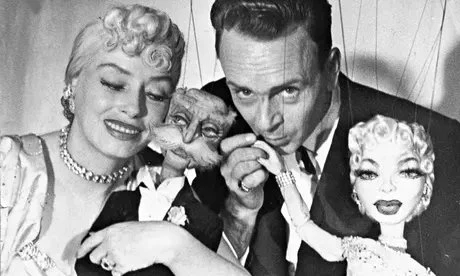
In 1964 this series became Tichpuzzle, a programme of comedy and puzzles introduced by Ray, assisted, interrupted and generally thwarted by Tich and Quackers. The introduction of Quackers proved so popular that when Ray next appeared in the BBC children’s slot the series was retitled Tich and Quackers.
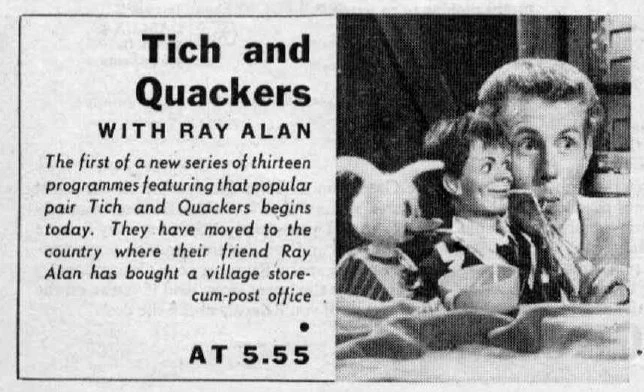
Ray Alan was a TV regular for years and was technically regarded as Britain's top ventriloquist. His agent, Peter Pritchard, said: “You just couldn't see his mouth moving. He was tremendously well-liked in the business and he had been in the entertainment business all his life." A notable guest on gameshows such as Celebrity Squares, Give Us A Clue and 3-2-1, as well as appearing in programmes such as Sunday Night at the London Palladium, he was among the stars who performed at a TV celebration for legendary comic actor Bob Hope's 82nd birthday. He tackled his work with meticulousness, yet devoid of emotion. He disapproved of ventriloquists who were “possessed” by their dummies. “Over time, several vents have gone bonkers,” he once remarked sharply. “Lord Charles is stowed away in the suitcase once I’m done with a performance, and if I don’t work for three months, he remains concealed. He’s a mere instrument, a cog in the machinery”.
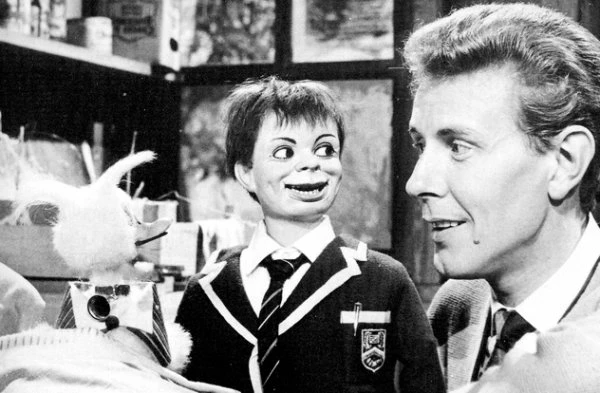
Ray Alan was also a prolific author. He wrote for artists Tony Hancock and Dave Allen. He also wrote for the shows Morecambe and Wise, The Two Ronnies, and Bootsie and Snudge, often penned under the name Ray Whyberd. He also wrote four novels, the first being Death and Deception which was published in 2007, followed by A Game of Murder in 2008, A Fear of Vengeance in 2010, and Retribution, which was published posthumously in 2011. Alan continued to perform into his seventies. In the 1990s, he still appeared on television in both Britain and the U.S. Much of his work during this period was on cruise ships.
One of the finest exponents of his art, Ray Alan’s appeal transcended all ages. He was, as Lord Charles might say, “a damn fine chap!”
Seen this show? How do you rate it?
Seen this show? How do you rate it?
Published on September 20th, 2023. Written by Malcolm Alexander for Television Heaven.


